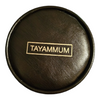Tabari:Selections from The Comprehensive Exposition of the Interpretation of the Verses of the Qur'an 2 Vol Set
Tabari:Selections from The Comprehensive Exposition of the Interpretation of the Verses of the Qur'an 2 Vol Set.
Author:Tabari, Muhammad Bin Jarir
Binding:Paperback
Pages:1196
Size:16x23
Publisher:Islamic Texts Society
Tabari’s Qur’an Commentary, Comprehensive Exposition of the Interpretation of the Verses of the Qur’an, is one of the great monuments of classical Arabic and Islamic scholarship which, over a millennium, has been a fundamental reference work for scholars engaged in the tradition of Qur’anic exegesis. This two-volume translation focuses on thirty selected verses and Suras, or Chapters, associated with special merits and blessings and also includes Tabari’s own introduction to the Comprehensive Exposition.
Volume I contains: Tabari’s introduction; The Opening; the Throne Verse and the final three verses from The Cow (2:255 and 284–286); The Family of ‘Imran (3:7 and 18); Repentance (9:38–40 and 128–129); the story of Moses and al-Khadir from The Cave (18:60–82); the Verse of Light from The Light (24:35–42); Prostration; Ya’ Sin.
Volume II contains: The Companies (39:53–55); The Smoke; The Beneficent; The Inevitable Occasion; Iron; The Gathering (59:18–24); Sovereignty; The Resurrection; The Most High; The Sun; The Night; The Earthquake; The Chargers; Rivalry; The Disbelievers; Aid; Sincerity; Daybreak; People.
Abu Ja’far Muhammad b. Jarir al-Tabari (d. 310/923) is one of the most famous Muslim scholars of medieval Islamic civilisation. He composed numerous books in Arabic in the fields of Islamic law, Qur’an commentary and history. The only two large books of his to survive are his History of Messengers and Kings and his Qur’anic commentary, The Comprehensive Exposition of the Interpretation of the Verses of the Qur’an.
Scott C. Lucas is Associate Professor of Islamic Studies in the School of Middle Eastern and North African Studies at the University of Arizona.
Have Questions? Ask An Expert
Related Products
From this Collection
-
Assalaat (Prayer)
Al-Fatiha
£11.75£10.00Assalaat (Prayer) Author:abdul aziz bin abdullah bin bazPages:128Size cm:11x16Publisher:Darul M... -
Collection of An-Nawawi 40 Hadith - Mini booklet
Al-Fatiha
£14.00Collection of An-Nawawi 40 Hadith - Mini booklet Author:Imaam Abu Zakariyyah An NawawiBinding:s... -
Goodword Islamic Studies: Textbook for Class-4
Al-Fatiha
£15.00Goodword Islamic Studies: Textbook for Class-4 Author:Saniyasnain KhanBinding:soft coverPages:6... -
Goodword Islamic Studies: Textbook for Class-5
Al-Fatiha
£15.00Goodword Islamic Studies: Textbook for Class-5 Author:Saniyasnain KhanBinding:soft coverPages:6... -
Goodword Islamic Studies: Textbook for Class-6
Al-Fatiha
£15.00Goodword Islamic Studies: Textbook for Class-6 Author:Saniyasnain KhanBinding:soft coverPages:6... -
Goodword Islamic Studies: Textbook for Class-7
Al-Fatiha
£15.00Goodword Islamic Studies: Textbook for Class-7 Author:Saniyasnain KhanBinding:soft coverPages:6... -
Goodword Islamic Studies: Textbook for Class-8
Al-Fatiha
£15.00Goodword Islamic Studies: Textbook for Class-8 Author:Saniyasnain KhanBinding:soft coverPages:6... -
Goodword Islamic Studies: Textbook for Class-10
Al-Fatiha
£15.00Goodword Islamic Studies: Textbook for Class-10 Author:Farida KhanamBinding:soft coverPages:64S... -
LEARN ISLAM (Part 1) Simple Translation of TA'LEEMUL ISLAM
Al-Fatiha
£16.00LEARN ISLAM (Part 1) Simple Translation of TA'LEEMUL ISLAM Author:Abdullah FahimBinding:Paperba... -
Release from the Shackles of Desires
Al-Fatiha
£15.00Release from the Shackles of Desires Author:Ibn QayyimBinding:Soft CoverPages:54Size cm:18x13 c... -
Commands on the Waiting Period for Widows
Al-Fatiha
£14.00Commands on the Waiting Period for Widows Author:Bint Umar Faruq LuharviBinding:Hard CoverSize c... -
ALLAH And Me
Al-Fatiha
£15.00ALLAH And Me Author:Vinni RehmanBook By Language:EnglishBinding:Soft CoverPages:63Size cm:17x24... -
Goodword Arabic Writing Book 1
Al-Fatiha
£15.00Goodword Arabic Writing Book 1 Author:Muhammad Imran ErfaniBook By Language:ArabicBinding:S/... -
Learn The Arabic Alphabet
Al-Fatiha
£15.00Learn The Arabic Alphabet Author:Assad Nimer BusoolBook By Language:EnglishBinding:S/CPages:61S... -
The Benefits Of Fearing Allah
Al-Fatiha
£20.00The Benefits Of Fearing Allah Author:Imam Muhammag Salih Al-UthayminBook By Language:EnglishBi... -
Christan Muslim Dialogue
Al-Fatiha
£15.00Christan Muslim Dialogue Author:H.M. Baagil, M.DBook By Language:EnglishPackaging:brand new fas... -
The Essentials of Islam
Al-Fatiha
£20.00The Essentials of Islam Author:Al-Haj Saeed Bin Ahmed AL-LootahBook By Language:EnglishBinding:... -
Problems and Solutions
Al-Fatiha
£16.00Problems and Solutions Author:Muhammad Salih al-MunajjidBinding:Soft CoverPages:64Size cm:16x21... -
Islamic Teachings Course Vol-2
Al-Fatiha
£15.00Islamic Teachings Course Vol-2 Author:Dr Jamal BadawiBinding:PaperbackPages:80Size cm:18x25 cmP... -
The Truth About Jesus Christ
Al-Fatiha
£20.00The Truth About Jesus Christ Author:Dr. Muhammad Ali AlkhuliBook By Language:EnglishBinding:S/C... -
30 Ways To Enter Paradise
Al-Fatiha
£14.2430 Ways To Enter Paradise Author:Dr Abdullah AbdurrahmanBook By Language:EnglishBinding:Soft Co... -
Death
Al-Fatiha
£15.00Death Author:Shaykh Alee Hasan Alee Abdul HameedBook By Language:EnglishBinding:S/CPages:51Size... -
Essential Contemplations For Every Muslim
Al-Fatiha
£15.00Essential Contemplations For Every Muslim Author:Al-Mu'allimee Al-YamaaneeBinding:S/CPages:52Si... -
Governing yourself and your Family
Al-Fatiha
£15.00Governing yourself and your Family Author:Shaykh Husayn Al-AwaayishahBinding:S/CPages:64Size cm... -
The Evil Of Craving For Wealth And Status
Al-Fatiha
£20.00The Evil Of Craving For Wealth And Status Author:Al-Haafidh Ibn Rajab Al-HanbaleeBook By Langua... -
Weeping From the Fear Of Allah
Al-Fatiha
£20.00Weeping From the Fear Of Allah Author:Shaykh Husayn Al-AwaayishahBook By Language:EnglishBindin... -
33 Ways To Concentrate In Your Prayer
Al-Fatiha
£14.9933 Ways To Concentrate In Your Prayer Author:Muhammad Salih Al-munajjidBook By Language:English... -
The Life of Imam Bin Baz
Al-Fatiha
£20.00The Life of Imam Bin Baz Author:Shaykh, Dr Fahad al-FuhaydBinding:PaperbackPages:32Size cm:14x2... -
Eid Mubarak Islamic Celebration Around The world
Al-Fatiha
£16.00Eid Mubarak Islamic Celebration Around The world Author:Susan DouglassBinding:PaperbackPages:11... -
Backbiting The Way To Hellfire
Al-Fatiha
£14.00Backbiting The Way To Hellfire Author:Waheed Abdussalam BallyBook By Language:EnglishBinding:so... -
How Do I Turn To ALLAH?
Al-Fatiha
£15.00How Do I Turn To ALLAH? Author:Sheikh Mohammad Hussain YaqubBook By Language:EnglishBinding:P/B... -
Overcoming the Fear of Death & Illness
Al-Fatiha
£15.00Overcoming the Fear of Death & Illness Author:Dr. Muhammad Abu RahimBinding:P/BPages:70Size... -
Description of Hajj described in pictures صفة الحج المبرور بالصوره
Al-Fatiha
£15.00Description of Hajj described in pictures صفة الحج المبرور بالصوره Author:Badr al-FilkaawiBindi... -
For The Sincere
Al-Fatiha
£24.00For The Sincere Author:Khalid Green & Shadeed MuhammadBook By Language:EnglishBinding:Soft ... -
Two Treatises On The Prayer
Al-Fatiha
£20.00Two Treatises On The Prayer Author:Imaam Ibn BaazBook By Language:EnglishBinding:Soft CoverPage... -
Fatawa As Sayam Urdu / فتاوی الصّیام اردو
Al-Fatiha
£16.00Fatawa As Sayam Urdu / فتاوی الصّیام اردو Author:Muhammad Bin Saalih Al UthaymeenBook By Langua... -
الجزريّة The Island
Al-Fatiha
£11.75£10.00الجزريّة The Island Author:Imam Muhammad Bin JazariyBinding:PaperbackPages:20.Size cm:14x17 cmP... -
Until You Return To Practising Your Deen
Al-Fatiha
£20.00Until You Return To Practising Your Deen Author:Sheikh Muhammad Abdulwahab Mazrooq Al-BannaPage... -
Worship Allah and Associate None With Him وَعبُدُاللَّٰهَ وَلَا تُشّرِكُو بِهِ شَيْئَا
Al-Fatiha
£20.00Worship Allah and Associate None With Him وَعبُدُاللَّٰهَ وَلَا تُشّرِكُو بِهِ شَيْئَا Author:A... -
An Introduction to the Science of Hadith
Al-Fatiha
£15.00An Introduction to the Science of Hadith Author:Dr. Suhaib HasanBinding:Soft CoverPages:64Size ... -
The Many Shades of Shirk
Al-Fatiha
£20.00The Many Shades of Shirk Author:Fadlur Rahman Klaim KashmiriBinding:soft CoverPages:64Size cm:1... -
Who is ALLAH & His Prophet ( Peace be upon him / صلی الله علیه وآله وسلم )
Al-Fatiha
£20.00Who is ALLAH & His Prophet ( Peace be upon him / صلی الله علیه وآله وسلم ) Author:Al-Arabi ... -
A Brief Illustrated Guide to Understanding Islam
Al-Fatiha
£15.00A Brief Illustrated Guide to Understanding Islam Author:Darussalam Research DivisionBinding:Sof... -
The Light of Guidance
Al-Fatiha
£20.00The Light of Guidance Author:Dr. Muhammad Muhsin KhanBinding:Soft CoverPages:170Size cm:15x21 C... -
A Glimpse at the Beauty of Islam
Al-Fatiha
£15.00A Glimpse at the Beauty of Islam Author:Darussalam Research DivisionBinding:Soft CoverPages:103... -
Perfecting The Obligatory : A Treatise on the Performance of the Sunnah Prayers
Al-Fatiha
£15.00Perfecting The Obligatory : A Treatise on the Performance of the Sunnah Prayers Author:Abdulla ... -
Paradise : The Bliss & The Path to it
Al-Fatiha
£15.00Paradise : The Bliss & The Path to it Author:Alee Hasan Alee Abdul-HameedBook By Language:E... -
The Dispute of the Highest Angels
Al-Fatiha
£20.00The Dispute of the Highest Angels Author:Al-Hafidh Ibn Rajab Al-HanbaliBook By Language:English... -
General Precepts of Ahlus-Sunnah wal-Jamaa'ah
Al-Fatiha
£15.00General Precepts of Ahlus-Sunnah wal-Jamaa'ah Author:Shaykh Naasir Al-AqlBook By Language:Engli...





































































































